|
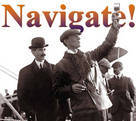
 Up
Up 
 A Life on Hold
A Life on Hold

(You are here.)



  Need
to Need
to
find your
bearings?
Try
these
navigation aids:
If
this is your first
visit, please stop by:
Something
to share?
Please:



|
|
Available in Française, Español, Português, Deutsch, Россию,
中文,
日本, and others.
 hen
the Wrights moved back to Dayton for the last time, their mother was in
poor health. Wilbur, a top-notch scholar and seemed bound for
Yale where he planned to study to become a minister. He enrolled in Central High School and took college preparatory
subjects such as advanced Latin, rhetoric, and trigonometry. He also played football,
and his teammates remembered how swiftly he could run a ball down the
field. hen
the Wrights moved back to Dayton for the last time, their mother was in
poor health. Wilbur, a top-notch scholar and seemed bound for
Yale where he planned to study to become a minister. He enrolled in Central High School and took college preparatory
subjects such as advanced Latin, rhetoric, and trigonometry. He also played football,
and his teammates remembered how swiftly he could run a ball down the
field.
Troubles All Around
In the winter of 1886, his dreams of college came to an end when he
was smashed in the face with a stick during a game of
"shinny" (a precursor to hockey) and lost his upper front teeth.
Complications ensued. Although his facial injuries healed, a few weeks
afterwards he developed "nervous palpitations of the heart"
and digestive problems. After a year's rest, these too disappeared, but
Wilbur was somewhat changed. He thought himself an invalid (or at least
as someone with a frail, vulnerable constitution) and decided that a
college degree "would be money and time wasted." He may have
also had a change of heart about leaving home, especially with his
mother so sick – the Wrights were a tight-knit family. Whatever the
reason, he put his life on hold and made it his job to nurse his mother
Susan. His curiosity and his affinity for learning remained unchanged,
however. When he wasn't looking after his mother, he read voraciously.
Orville's interest in school waned.
He too may have been been worried about his mother's health, but
there is evidence of other problems. While still in Richmond, he
had been suspended from sixth grade for some mischief during the last
few weeks of the school year and arrived in Dayton without a graduation
certificate. He entered seventh grade and proved that he could handle
the course work, but he apparently had some more mischief in him. His
eighth- and ninth-grade teacher, Miss Jennings, kept him in a seat at
the front of the class so she could keep an eye on him. His grades were
passable, but unspectacular. He seemed to do better in math and science
but not memorably so. His ninth-grade botany teacher, William Werthner,
recalled him "...as a quiet boy, faithful in his work, but not
strikingly different from the rest."
In 1889, the progressives in the United Brethren Church pushed
through a new constitution allowing membership in secret societies. Bishop Milton Wright
bitterly opposed this change and decided to split from his church. Secret societies such
as the Masonic Order had been a pernicious influence in the early years of American
politics. When the United States was very young, secret societies formed an elitist network that conferred upon their members unfair advantages
in business and politics. Some secret societies like the
Know-Nothings encouraged bigotry and violence. But by the latter half of the nineteenth century,
these had mostly devolved into social clubs with only a vestige of their former
power. Nonetheless, the Bishop regarded the secret rituals and symbols employed by
Freemasonry and others as a sacrilege. With other United Brethren conservatives, he
organized a new sect, the Church of the United Brethren in Christ (Old Constitution). At a
church congress in Pennsylvania, he was unanimously elected its head, then came home
to Dayton to find his wife failing. A little more than a month later, Susan Wright died of
tuberculosis.
|
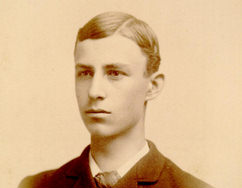
Wilbur Wright was 17 when his family moved to Dayton, Ohio. He was an
accomplished gymnast, football player, and scholar bound for college.
All of that would change in the blink of an eye.
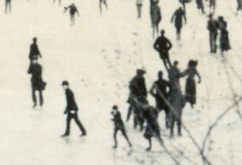
Ice skating on the Great Miami River in Dayton, Ohio.
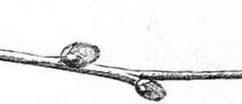
Although Orville lost interest in school in general, he seemed to like the
sciences. This painstakingly detailed sketch of a pussy willow branch is from his 1897
botany notebook.
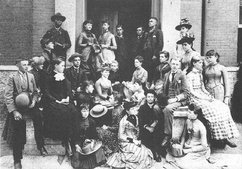
The class of 1890 at Central High School in Dayton, Orville's last year in
school. Orville stands in the middle of the doorway. His friend Paul Laurence Dunbar, who
later became a great poet, stands at the upper left.
|